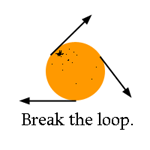

 | Tangentium |
January '04: Menu
All material on this site remains © the original authors: please see our submission guidelines for more information. If no author is shown material is © Drew Whitworth. For any reproduction beyond fair dealing, permission must be sought: e-mail drew@comp.leeds.ac.uk. ISSN number: 1746-4757 |
January 2004: Social Exclusion, Language and ITIntroductionWelcome to the second issue of Tangentium. Having taken a tentative step into the water with our opening issue on IT education and democracy, this month's issue is slightly larger, with two feature and two supplementary essays on the subject of Social Exclusion, Language and IT. Thanks to everyone who responded to our first issue with comments and suggestions; as ever, we encourage all interested parties to help with the development of this online resource. Why devote this second issue to a subject which may seem old hat? We are frequently told that a "digital divide" is developing - that a substantial proportion of the population (whether at a national level, or globally) are being excluded from new online public spheres whether through poverty, lack of educational opportunities or attitudinal problems. However, it is not our intention to merely repeat these warnings, although some of this month's essays certainly draw attention to this developing divide. A more constructive and interesting approach is to say, very well, these divides are developing: so how can they be reduced? Better still, how can the application of IT specifically help reduce not only digitial divides but those other divisions in society which are not directly to do with IT in the first place? The causes of social exclusion are deep. Many of those already mentioned - poverty, lack of education - are interlinked. This is one argument of the feature essay The Digital Learning Divide by Gerry McAleavy, T. Donegan and Celia O'Hagan of the University of Ulster. But despite the common argument that ICT exacerbates these problems, McAleavy et al observe that it also opens up new opportunities for access to services that deprived communities often lack. ICT can increase aspiration, and lead to new opportunities for community development, and employment. It is also the case that communities have their own ideas of what ICT skills they require, rather than necessarily conforming to the expectations of government. Unfortunately they are often excluded from decisions made about their "needs". This point is significant. The term "social exclusion" is often used synonymously with "deprivation", but we should be aware of the nuances here. One is "excluded" from things: particular gatherings of people, for instance, or certain places. Sometimes this exclusion is random, but usually it is bound up in certain "rules": the colour of one's skin, perhaps, one's gender, or one's financial status. And enforcing these rules of exclusion, whether by force or by more subtle means, is an exercise of power. Power is often manifested as the ability to decide who will be admitted to a particular group or place, and who will be excluded. We have included a short supplementary essay, Language, Knowledge and Exclusion, which considers some of the more subtle ways in which our society practises exclusion through the use of subcultures of meaning, jargon and qualifications. These form another strand of the broad skein of causes of social exclusion, bound up as they are in turn with poverty, education and services. Here too ICT can help, however. The feature essay Language Engineering and Public Policy, by Kevin Carey, examines the ways in which public documents can be manipulated to exclude many from understanding, and thereby participating in, governmental debate. But Carey also notes that the technology exists to help combat these exclusionary tendencies. This essay should be read alongside the fourth and final essay in this month's issue, Electronic Text Technologies, which provides a brief summary of what it suggests, hopefully providing some background on the technologies which would underpin Carey's suggestions for the democratisation of public information via ICT. Finally, as ever, there are pages on which this month's key terms are defined, a collection of quoted snippets, and a list of reviewed links and resources. We hope you enjoy them. | |